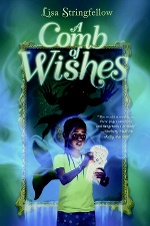Publishers' Preview: Diverse Books Spotlight: Five Questions for Lisa Stringfellow
Beachcombing near her home in the Caribbean, Kela finds more than she was looking for. A Comb of Wishes, though, can be a dangerous thing in this fantasy adventure.

This interview originally appeared in the January/February 2022 Horn Book Magazine as part of the Publishers’ Previews: Diverse Books Spotlight, an advertising supplement that allows participating publishers a chance to each highlight a book from its current list. They choose the books; we ask the questions.
Sponsored by

Beachcombing near her home in the Caribbean, Kela finds more than she was looking for. A Comb of Wishes, though, can be a dangerous thing in this fantasy adventure.
 1. Do you own an item that you consider to be magical?
1. Do you own an item that you consider to be magical?
They’re not items, but I think my cats are a bit magical. If I have a conversation with one of them, I’m positive they understand; they probably think I’m always making things more complicated than they need to be. One of my favorite characters is the cat in Coraline by Neil Gaiman. I’m pretty sure if we were in the “other” world, my cats would have quite a lot to say to me.
2. Spotting sea glass sounds hard. Is it?
It can be. It’s been a long time since I searched for sea glass, but I love the way that looking for it forces you to slow down. It’s not an activity where speed is needed. Every discovery feels like finding a piece of treasure in the sand. You need to be patient and careful to spot the hidden gems that might be waiting for you.
3. Ever been tempted past a “Do Not Enter” sign?
 Absolutely not! I was always the one dragged by my friends into situations that made me itch to leave. I’m a rule follower by nature, so I would assume the sign was there for a reason, and that would be good enough for me.
Absolutely not! I was always the one dragged by my friends into situations that made me itch to leave. I’m a rule follower by nature, so I would assume the sign was there for a reason, and that would be good enough for me.
4. If you could wish yourself onto any beach in the world, where would you go?
Heywoods Beach near Speightstown in Barbados. It is a peaceful, sandy beach a short walk from the home where my father grew up. I have pleasant memories from the last time I was there as a teenager, on a trip to visit family on the island.
5. What has teaching children taught you about writing for them?
Children are wise, resilient, and empathetic. Some adults hold the mistaken belief that writing for children means writing with less complexity. Far from it: writing for children means you can write about important and meaningful topics with rich layers. Stories need to be “felt” by the reader. The job of a writer is to help children tap into their emotions through the story. By connecting with the characters, they connect with people in the world around them.
Sponsored by

Photo: Carter Hasegawa.
RELATED
ALREADY A SUBSCRIBER? LOG IN
We are currently offering this content for free. Sign up now to activate your personal profile, where you can save articles for future viewing.







Add Comment :-
Comment Policy:
Comment should not be empty !!!